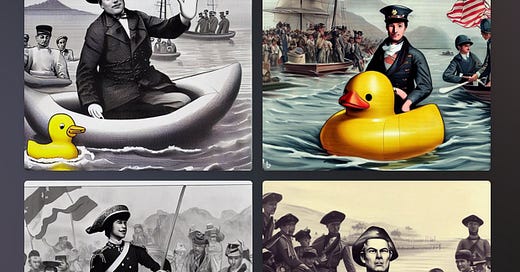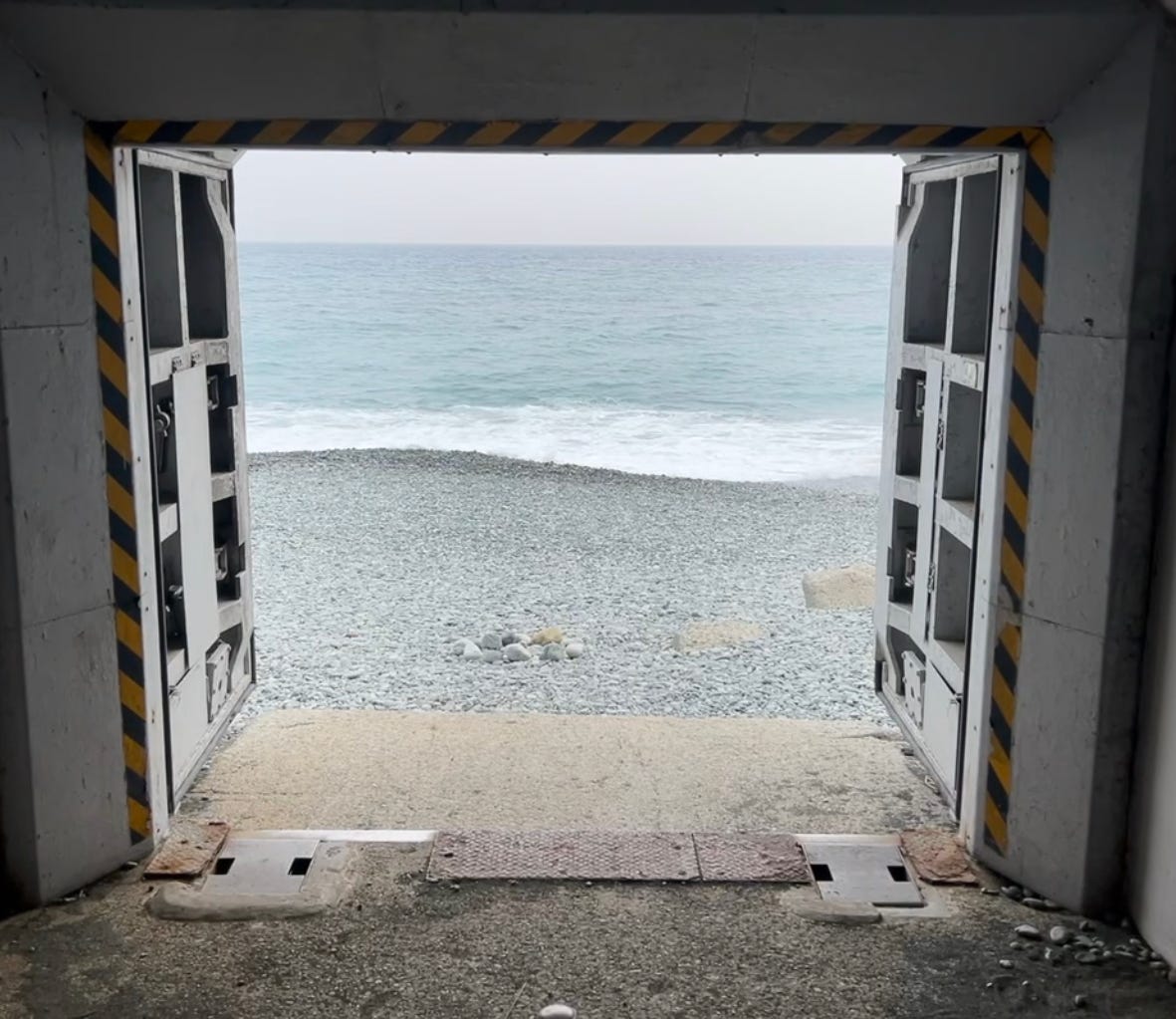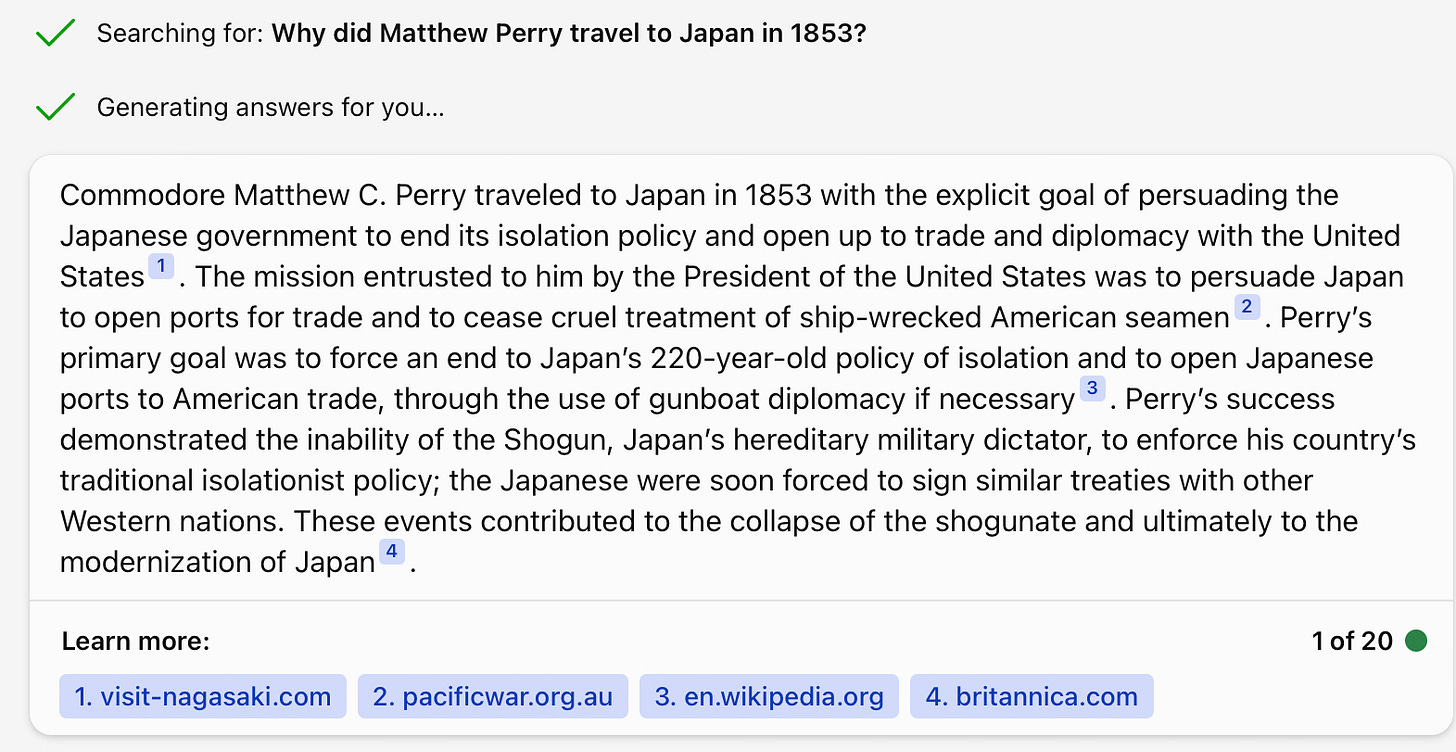Dear Friends,
On our penultimate day in Japan, I stared through a concrete portal to the lonely, lapping waves of the Pacific Ocean and wondered what it was like for the Japanese fishermen who first spotted the “four evil black warships” led by U.S. Commodore Matthew Perry in 1853.
You never know when something unexpected shows up at your doorstep: a warship, a pandemic, a mysterious floating balloon, a UFO. I thought about how the relations between countries are impossible to predict yet so easy to explain after the fact. How history repeats; we just don’t know when.
From isolationism to imperialism to anti-terrorism
Japan was famously isolated from the rest of the world for 265 years from 1603 until 1868. Leaving or entering the country was punishable by death. When European monarchs sent envoys to discuss trade deals, they were occasionally executed upon arrival. When whaling expeditions washed up on the Japanese shore, they were treated like prisoners of war. It wasn’t until Perry’s arrival that Japan was forced to engage with the rest of the world.
Imagine, for 265 years you’re minding your own business until four big warships roll up demanding diplomatic relations. Japan then rapidly went from isolationist to imperialist. After all, if European countries could establish colonies all over the world, why not Japan? Using the colonizer’s preferred language of “establishing protectorates” and “helping our Asian neighbors develop,” Japan violently colonized China, Taiwan, Korea, Hong Kong, Indonesia, East Timor, and practically all of South East Asia and the Pacific Islands. They had their eyes set on Australia and (like the US) Hawaii.
After 265 years of total isolation (missing out on the Scientific and Industrial Revolutions!), how did Japan manage to take over so much of the world so quickly? And what were they thinking when they decided to bomb Pearl Harbor while already overextended militarily across Asia? The whole thing is difficult to comprehend.
Over two million Japanese soldiers died during WWII. Over 100,000 innocent people died when the US dropped nuclear bombs on Hiroshima and Nagasaki. And yet, Japan losing WWII was perhaps the best thing that could have happened to the country? From the end of the war through the 90s, Japan experienced an Economic Miracle of long-term 11% annual growth. From war-torn ash, Japan churned out one after another of the world’s most recognized brands: Toyota, Honda, Nissan, Sony, Toshiba, Panasonic, Mitsubishi, Nintendo, Suzuki, Fujitsu. Did you know that 7-11 is a Japanese company? Neither did I! In the 80s and 90s, it felt like the rest of the world was stuck in the past while Japan was on a bullet train to the future. In 1989, Mitsubishi flexed and took over the Rockefeller Center on its 50th anniversary. Some semi-racist protestors warned that New York City was selling its soul to the Japanese emperor. Today, Japan isn’t just the third largest economy after the US and China; it is also the most economically equal country (by wealth distribution). After South Korea, its democracy is the highest ranked in Asia. Who could have ever predicted?
At this point, you may be wondering why I’m using this week’s newsletter to recapitulate Japan’s well-documented history when ChatGPT could surely do so more concisely. (I just checked and it’s true.)
I suppose I feel compelled to share one of the unexpected delights I have discovered in middle age: watching the world unfold in ways I never could have predicted when I was in my 20s and thought that I knew everything. It’s a wonderful exercise in humility, and a useful reminder that the next 20 years will be at least as weird as the last.
Colonies, Cold Wars, and a Clash of Civilizations
World War II marked the end of the colonial era and the start of the 40-year Cold War. Then came 1989, the fall of the Berlin Wall, the end of the Cold War, and the start of my favorite decade, the 90s. We were entering a new era but didn’t know what to call it. “The end of history” was catchy. For me, it was an adolescence of optimism: economic growth, free trade, cheap travel, the internet when it was still fun, a balanced budget, great music, and witty sarcasm. 1989-2001 was a great time to come of age, even if we were ruining the planet with our amazing road trips when gas was $1 a gallon. (Sorry!)
Then, Y2K didn’t manifest but 9/11 did. I was backpacking in the Indian Himalaya on 9/11/2001. I didn’t even find out until the following week. Just two weeks later, I flew from Delhi to Tokyo and visited Japan for the first time. What I remember most about that first visit 22 years ago is how expensive everything was (yes, compared to India but also compared to California). On a backpacker’s budget, I could barely afford to eat anywhere that wasn’t a noodle shop or a convenience store.
The following week, the US started a war in Afghanistan that would last for two decades and cost more than $837 billion. We now had a new name for a new era: the global war on terror.1 I was in college. We were taught that it wasn’t the End of History after all, but rather a Clash of Civilizations and were assigned Benjamin Barber’s Jihad vs. McWorld.2
By the start of the pandemic in 2020, the War on Terror didn’t conclude so much as fizzle. There used to be so many terrorist attacks that Wikipedia had to break them down by month. Now there are just a handful each year, and the media hardly notice. Once again, we’ve entered a new era of international relations, and again we don’t know what to call it.
Cold War II?
Over the past month, if the news article wasn’t about artificial intelligence, it was probably about a new cold war with China and Russia.
It’s wild: 100 years ago, Japan and Russia were trying to figure out how to carve up China and Korea into respective colonies. 60 years ago, China went through a famine that caused the starvation of more than 15 million people. 35 years ago, Reagan and Gorbachev toasted “the hope of peace with freedom.” And then last week, Xi and Putin met in that very same room to strategize how to push back against U.S. hegemony. There is no way anyone could have predicted these shape-shifting alliances.
Japan and Korea are now putting aside historic grievances from Japan’s imperial past in order to unite against China. After fears of nationalist fragmentation, Europe has never been more united. Even France and the UK look like besties now. Germany and Japan are reassembling their militaries despite protests from 80-something peaceniks, who said ‘never again’ back in 1968. The Philippines are inviting more US military presence while protesting China’s expanding presence in the South China Sea. Africa and Latin America mostly wanna stay away from the drama. It sure does feel like a new cold war.
For those of us born in the 80s, globalization and American dominance were a given. China was becoming the global hub of manufacturing, but it wasn’t a threat. Now, for the first time in our lives, there is this sense that we are in a race and we need to win if we don’t want to lose.
It’s no longer who gets to the moon first or develops the hydrogen bomb. Now it’s all AI. If the future of warfare is drones and disinformation, then whoever has the best chips and software wins.
This podcast with Chris Miller helped me understand the importance of the “triad of chips, algorithms, and data.” Without sophisticated chips, you can’t run sophisticated algorithms. And without big datasets, you can’t train the algorithms. Four out of the five hottest apps are Chinese, and China needs that data to train next-generation algorithms. And they need faster chips.
Chips have become so important that a former Trump official says the US planned to destroy Taiwan’s chip manufacturing plants if China were to invade.
If we are truly in a new cold war with China, does it actually change everything, as David Brooks insists? Or are our fears of China today overhyped and reminiscent of our needless fear of Japan in the 90s just before its economy faltered? (China today has no shortage of economic challenges.) As the US government rushes to invest money into the chip sector, will China’s state-investment-led economy turn out to be a house of cards? Is the US military truly falling behind on weapons innovation, as some argue, or are they merely looking for more military investment?
I don’t know the answers to these questions, but they are important. Robert Wright keeps a running tab of US foreign policy mistakes. We went to war in Vietnam, in part, because we thought (incorrectly) that China was steering their politics. We should have pulled out of Afghanistan far earlier. We should have never invaded Iraq.
Our mistakes are easy to name, and while we’re primed by evolution to focus on worst-case scenarios, rarely do they come to pass. Instead, new crises emerge that we never considered: perhaps a conflict between India and Pakistan, a major volcanic eruption, worsening drought in Somalia, next-generation terrorism, or rogue geoengineering gone wrong. Who knows.
I certainly don’t. Impossible to predict, but easy to explain. I’m excited to watch it unfold over the next 20 years.
🧰 A useful tool
I’m spending an ungodly amount of time reading about artificial intelligence and trying out the latest tools. If you haven’t tried out AI image creation yet, it’s easier than ever at Microsoft’s Bing Image Creator. Here’s what it gave me for “US Commodore Matthew Perry arriving to Japan in a rubber ducky boat in 1853.”
And while that’s not likely to overturn the historical record, plenty of folks were fooled by the “Trump getting arrested” and “Pope in a puffy jacket.” Just wait until generative AI meets video:
These tools are improving so quickly, it’s no wonder that prestigious researchers and executives are calling on all AI labs to pause anything more powerful than GPT-4.
The secret to making babies
The front page of yesterday’s Japan Times read “fears of societal collapse prompt new push for babies in Japan.” I met up with a friend of mine from high school in Tokyo, where he lives with his wife and daughter. He told me the government gave them $10,000 when she was born. And she has free healthcare until she’s 18. That apparently isn’t enough, so now according to the article:
Ideas like compulsory paternity leave, canceling student debt for people who have a baby, and ¥10 million ($76,445) payouts for a third child have been thrown around in recent weeks.
One of Japan’s hottest destinations is the one town in the whole country with a fertility rate above 2.
👏 Kudos: Tate recounts our trip to Ghana
I enjoy traveling and co-writing with my younger colleagues. Earlier this week my colleague Tate described our last trip together to Ghana. Tate has dyslexia and has become a role model for others who feel that they might not be able to do the kind of knowledge economy work in which he has excelled.
Have a great week!
David
Of course, this is a very US-centric view of international relations. Botswana didn’t care about the War in Terror; nearly one-third of its population was HIV-positive in 2001. Botswana’s life expectancy fell from 65 in 1995 to 35 in 2005. Slowing China’s AI development today is not a priority for Botswana.








Are you reealllly “excited” to watch all this unfold in the next 20 years? I rather not have to watch any of these lame ass males with egos destroy peace and the world. We need more women leaders. And Kiet T., Program Associate for Gender Equity & Sustainability, has a nice ring.